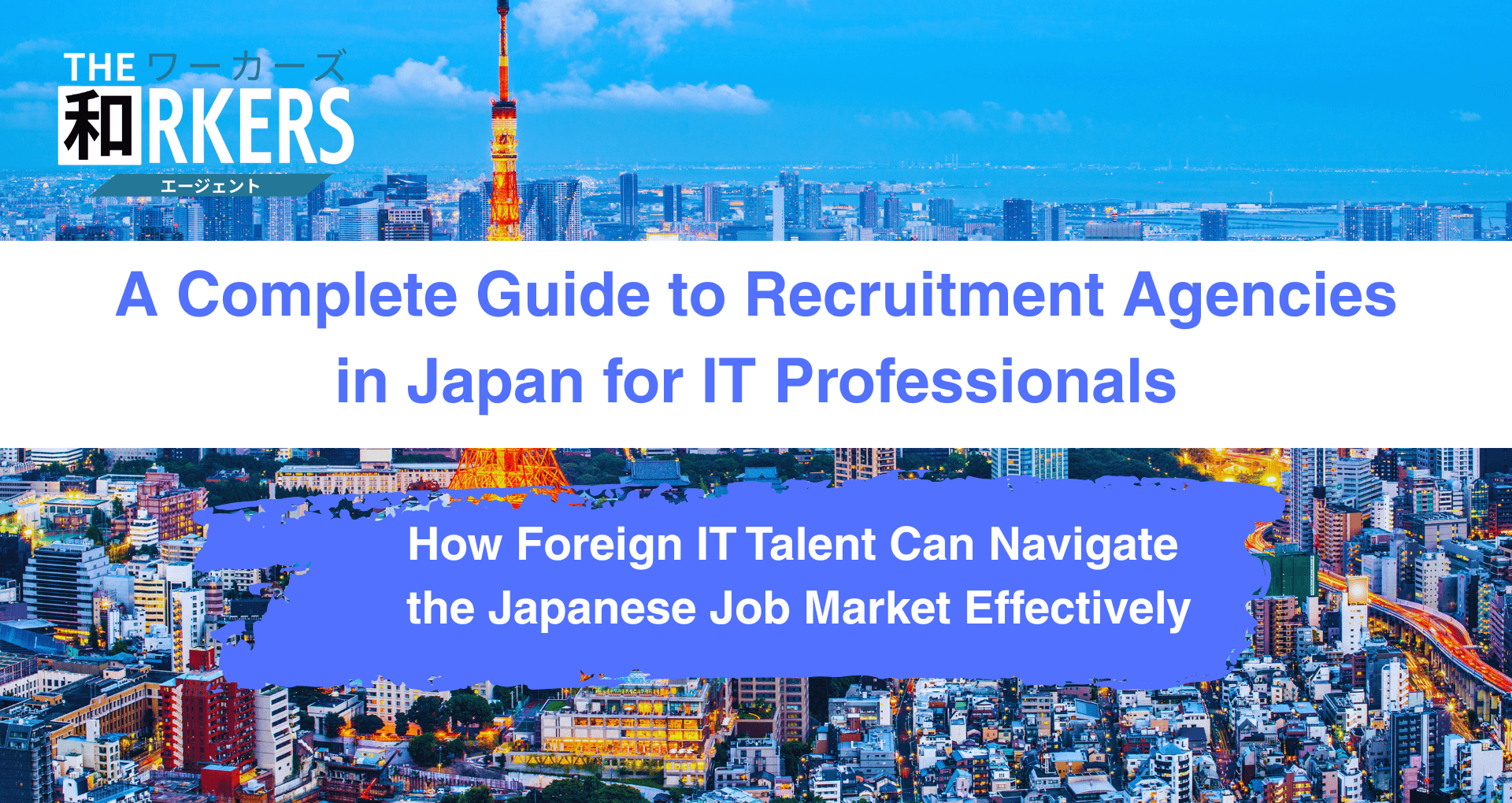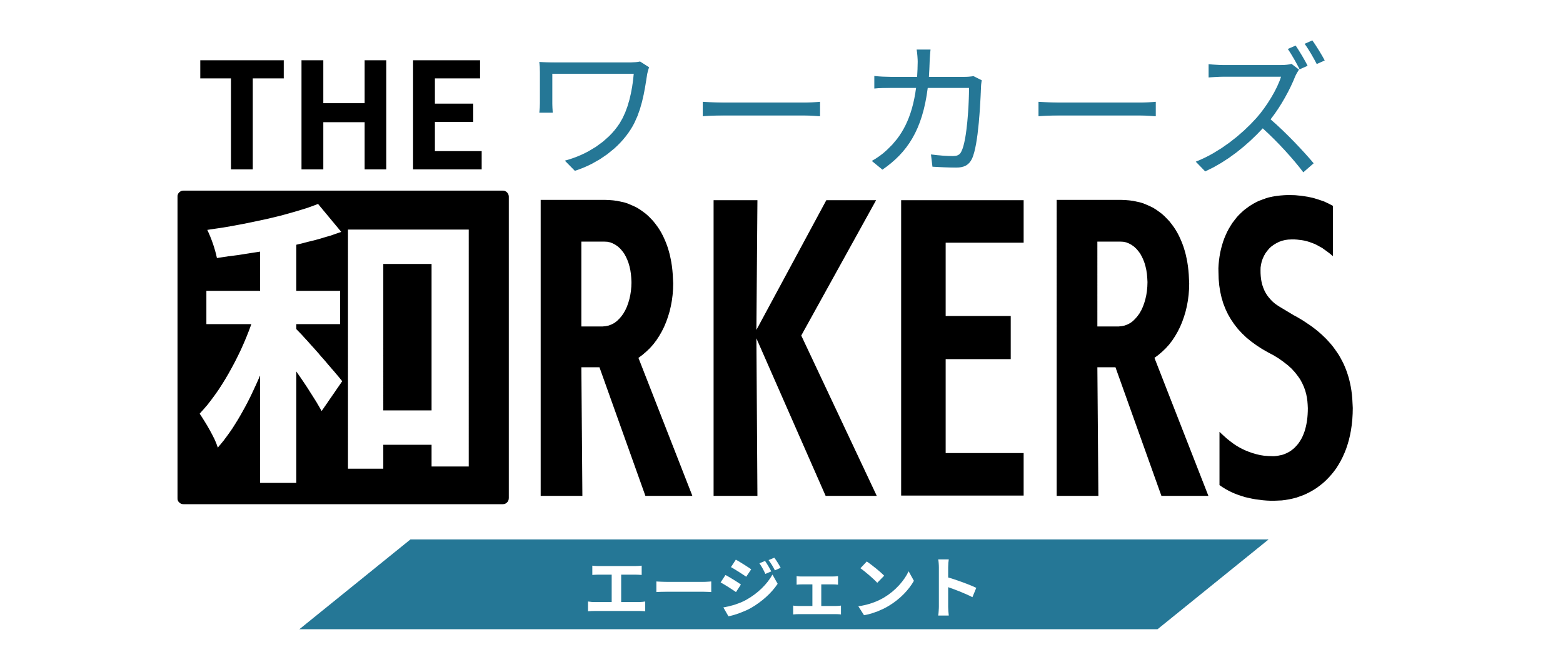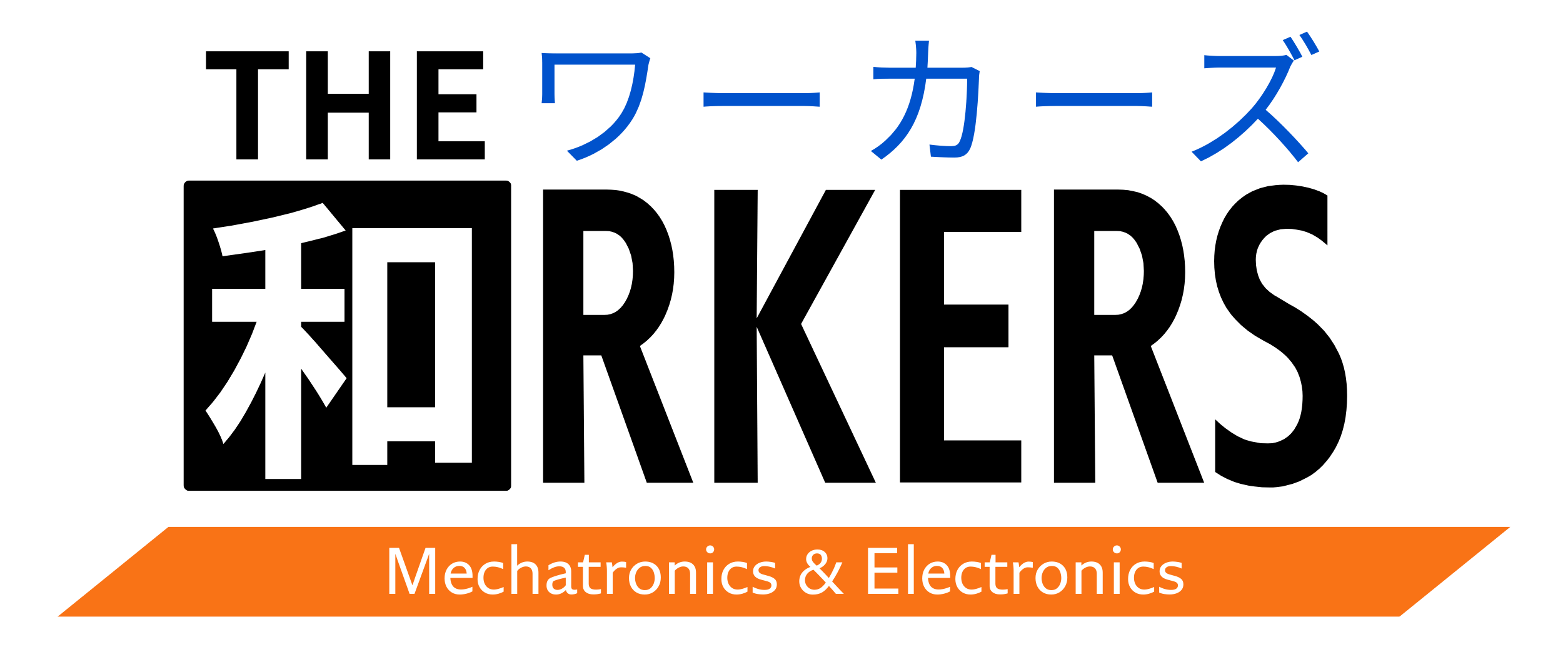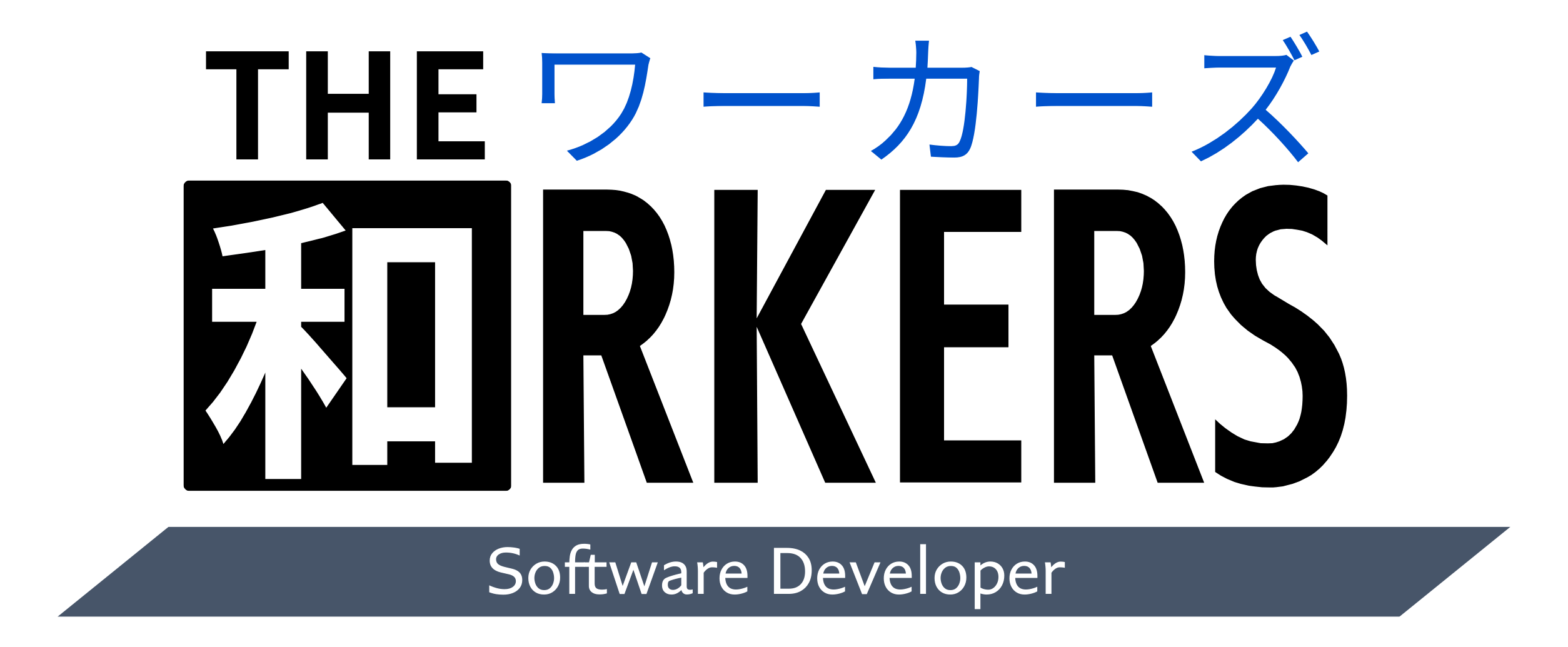A Complete Guide to Recruitment Agencies in Japan for IT Professionals

Looking to build your tech career in Japan, but not sure where to start?
Japan’s job market can be complex—especially for international IT professionals. But with the right recruitment agency by your side, navigating job opportunities, application processes, and cultural nuances becomes much easier.
In this guide, we’ll explain everything you need to know about recruitment agencies in Japan: how they work, what types exist, and how to choose one that’s right for you. Whether you’re a software engineer, data scientist, or IT consultant, this article is designed to help you take the next step in your career.
Overview of the Japanese Job Market for Foreign IT Talent
Japan is currently facing a significant demographic challenge: a rapidly declining working-age population. According to the National Institute of Population and Social Security Research (IPSS), the number of individuals aged 15 to 64—the working-age group—peaked at 87.26 million in 1995. IPSS indicates that this number will fall below 70 million by 2030 and further decline to approximately 63 million by 2040.
While advancements in automation and artificial intelligence may offset some labor demands in the future, the current reality is that many Japanese companies are already struggling to hire. A 2023 survey by the Japan Chamber of Commerce and Industry reported that nearly 70% of small and medium-sized enterprises (SMEs) face labor shortages, and more than 60% said this is negatively affecting their business operations.
The IT sector is particularly impacted. A study commissioned by Japan’s Ministry of Economy, Trade and Industry predicts that the country will face a shortage of up to 790,000 IT professionals by 2030. This includes roles such as software engineers, data scientists, DevOps specialists, and cybersecurity experts.
These dynamics have made Japanese employers increasingly open to hiring international tech talent. For foreign IT professionals with strong technical skills, Japan presents a growing number of opportunities—especially when supported by knowledgeable recruitment agencies.
What Are Recruitment Agencies in Japan?
Recruitment agencies—also known as “employment placement agencies”—play a crucial role in helping job seekers and employers connect in Japan. These agencies act as intermediaries between candidates and companies, helping to match the right talent with the right roles.
Types of Recruitment in Japan
There are two main categories of job-matching services in Japan:
- Recruitment Agencies (紹介型 / Shōkai-gata):
These agencies introduce job seekers to companies for permanent or contract roles. If the candidate is hired, the employer pays the agency a success fee. This is the most common type for professional and mid- to high-level positions, and it’s free for job seekers. - Temp or Staffing Agencies (派遣型 / Haken-gata):
These agencies hire workers directly and then dispatch them to work at client companies. This model is more common for clerical or operational roles and typically short- or medium-term.
Government Regulations and Licensing
In Japan, recruitment agencies must be officially licensed by the Ministry of Health, Labour and Welfare under the “Employment Security Act.” Legitimate agencies will display a license number known as the “Yūryō Shokugyō Shōkai Gyō Kyoka Bangō” (有料職業紹介事業許可番号).
How Recruitment Agencies Work for Foreign IT Talent
For international job seekers, especially those in IT, recruitment agencies often offer tailored services such as:
- Career counseling and job matching
- Resume and CV support (in Japanese and English)
- Interview preparation and language coaching
- Visa procedure guidance
- Cultural and workplace etiquette tips
Working with a recruitment agency is not only helpful—it’s often the most effective way for non-Japanese tech professionals to access top-tier roles, especially since many companies rely exclusively on agencies for hiring foreign talent.
Types of Recruitment Agencies in Japan
Japan’s recruitment industry is diverse and includes a wide range of agencies, each catering to different types of candidates and companies. Understanding the main categories can help job seekers—especially international IT professionals—choose the right partner for their career goals.
1. Generalist Recruitment Agencies
These are large, well-established firms that cover a broad range of industries and job types.
Examples include:
- Recruit
- PERSOL Career (formerly Intelligence)
- Tempstaff
They handle everything from entry-level to executive positions and may have thousands of listings. However, they often lack deep specialization in IT or foreign candidate support.
2. Specialized (Niche) Agencies
These agencies focus on a specific industry or job function. For IT professionals, this often means:
- IT-focused agencies
- Agencies specializing in bilingual or international candidates
- Start-up or tech-sector specialists
Specialized agencies tend to offer more targeted support, deeper industry knowledge, and stronger employer relationships in their focus area.
Choosing the Right Type of Agency
When selecting a recruitment agency, consider:
- Your career level (junior, mid, executive)
- Language ability (English-only, bilingual, Japanese fluency)
- Industry focus (tech/startups vs traditional sectors)
- Cultural fit and communication style
For foreign IT professionals, working with a specialized or bilingual agency usually provides the most tailored and supportive experience.
How Recruitment Agencies Support Foreign IT Professionals
For international tech professionals in Japan—or those considering a move—working with a recruitment agency can make a significant difference. While some companies accept direct applications, many prefer to work exclusively through trusted agencies, especially when hiring non-Japanese talent.
Here’s how a good recruitment agency can support foreign IT professionals:
1. Personalized Career Consulting
Recruiters provide one-on-one career advice based on your background, skills, and aspirations. They help you understand the Japanese job market, suggest suitable roles, and offer realistic guidance on what’s possible given your profile.
2. Resume and Portfolio Preparation (Japanese and English)
Crafting a CV for Japanese companies is different from International formats. Agencies help you tailor your resume, format it appropriately (including 職務経歴書 for Japanese employers), and highlight the most relevant achievements for each role.
3. Interview Preparation and Language Coaching
Interviews in Japan often include multiple rounds with HR, engineers, and executives. Agencies prepare you with:
- Mock interviews (in Japanese)
- Feedback on answers and body language
- Guidance on business etiquette and “what Japanese companies expect”
4. Visa and Documentation Guidance
While agencies don’t process visas themselves, many offer support or refer you to legal partners. They can help you:
- Understand your eligibility for the “Engineer/Specialist in Humanities/International Services” visa
- Collect and organize documents needed for switching jobs
- Avoid common pitfalls in visa renewal timing
5. Negotiation and Offer Management
Agencies act as a buffer during negotiations, helping you:
- Secure a fair salary based on market benchmarks
- Clarify working conditions, benefits, remote work policies, etc.
- Handle multiple offers professionally
6. Post-Placement Support
Some agencies offer onboarding support or follow up after placement to ensure a smooth transition. This is especially helpful for international candidates adjusting to Japanese corporate culture.
What to Look for in a Good Recruitment Agency in Japan
Not all recruitment agencies are created equal—especially when it comes to supporting international IT professionals. Choosing the right agency can be the difference between a frustrating job search and a successful career move.
Here are the key qualities to look for:
1. Experience Working with International Candidates
A good agency should have a proven track record of placing non-Japanese professionals in roles at Japanese companies. Look for:
- Multilingual recruiters
- Candidate testimonials from foreigners
- Familiarity with visa processes and relocation support
2. Specialization in Tech or IT Roles
Generalist agencies may offer many jobs, but they may not understand the nuances of software engineering, data science, DevOps, or product management. Tech-focused agencies:
- Know the technical skills employers are looking for
- Can match you with roles aligned with your expertise
- Understand the culture of tech companies and startups
3. Bilingual Support (English and Japanese)
Even if you’re fluent in English, navigating contracts, HR procedures, and cultural nuances is easier with a bilingual recruiter. Agencies with Japanese-speaking staff who also understand English can:
- Bridge communication gaps between you and the employer
- Help you prepare Japanese documents
- Advocate for you during offer negotiation
4. Transparency and Professionalism
Be wary of agencies that:
- Push you into roles that don’t match your goals
- Don’t follow up or communicate clearly
- Withhold job descriptions or company names
A good agency:
- Listens to your preferences
- Keeps you informed throughout the process
- Gives honest feedback and advice—even if it’s not what you want to hear
5. Access to Exclusive or High-Quality Roles
Some agencies have strong relationships with top-tier Japanese companies, including startups, public firms, and multinational employers. Ask:
- What kinds of companies do you work with?
- Do you have roles that aren’t publicly listed?
- Can you share examples of placements you’ve made recently?
Common Challenges for Foreigners in the Japanese Job Market
While Japan is becoming more open to hiring international tech talent, foreign job seekers still face a number of unique challenges when navigating the local job market. Being aware of these hurdles can help you prepare—and working with the right recruitment agency can make overcoming them much easier.
1. Language Barriers
Many companies still expect candidates to have at least conversational Japanese, especially outside the tech industry. Even in IT roles, Japanese proficiency may be required for:
- Internal communication and documentation
- Meetings with clients or cross-functional teams
- Reading contracts and HR materials
2. Unfamiliar Hiring Practices
Japan’s hiring process can be quite different from what you may be used to:
- Multiple rounds of interviews, often with HR, peers, and executives
- Emphasis on “cultural fit” and long-term commitment
- Traditional résumé formats (e.g., 履歴書 and 職務経歴書)
- More modest salary negotiations compared to Western markets
3. Overemphasis on Certifications or Degree Prestige
In some cases, Japanese companies may place greater value on formal credentials or university background than on practical skills—especially at more traditional firms. This can be frustrating for candidates with hands-on experience but no “brand-name” credentials.
4. Visa Complications
Switching jobs in Japan often requires updating your visa information with immigration authorities. Mistakes or delays can lead to serious issues, including loss of legal status. Common concerns include:
- Timing (notifications must be filed within 14 days of resignation/new employment)
- Understanding which documents are required
- Navigating the “Engineer/Specialist in Humanities/International Services” visa conditions
5. Lack of Support or Understanding
Some employers—especially those with little experience hiring foreigners—may struggle to provide proper onboarding, communication, or career development support. Without the right guidance, this can lead to misunderstandings or frustration on both sides.
Tips for Using a Recruitment Agency Effectively
Working with a recruitment agency can greatly boost your chances of landing the right job in Japan—but only if you use the partnership effectively. Here are some practical tips to get the most out of the experience:
1. Be Clear About Your Goals
Before engaging with an agency, take time to reflect on:
- What kind of role you want (e.g. backend engineer, data analyst, DevOps)
- Your preferred industry, company size, and working environment
- Language expectations (English only, bilingual, etc.)
- Desired salary and benefits
- Long-term career aspirations in Japan
Being upfront helps your recruiter suggest jobs that truly match your goals—and saves everyone time.
2. Communicate Promptly and Professionally
Treat your recruiter like a partner. Respond to messages and interview requests promptly, and keep them informed of your availability and preferences. Good communication builds trust—and recruiters are more likely to prioritize responsive candidates.
3. Don’t Rely on Just One Agency
It’s common in Japan to register with more than one agency. Each has different job listings and company connections. Just make sure to:
- Be transparent about your job search activities
- Avoid duplicate applications to the same company
Recruiters appreciate honesty and coordination—it protects both you and their relationship with clients.
4. Be Open to Feedback
Japanese hiring managers often care deeply about how candidates present themselves. Your recruiter may give you feedback on your resume, interview style, or even body language. Take it seriously—it’s meant to help you succeed in this specific market.
5. Ask Questions
A good agency will answer your questions clearly. Don’t hesitate to ask about:
- Company culture and working conditions
- Visa and relocation support
- Reasons why previous candidates succeeded or failed in similar roles
This helps you prepare better and shows you’re serious.
6. Stay in Touch—Even After Placement
Even after you land a job, keep your recruiter in the loop. They can help with future opportunities, visa renewals, or offer advice if you consider a career move down the line.
The more actively and transparently you engage with your recruiter, the better results you’re likely to get.
Remember: a good agency is invested in your long-term success—not just a one-time placement.
Introducing THE 和RKERS Agent
At THE 和RKERS Agent, we specialize in supporting international IT professionals who want to build meaningful careers in Japan.
Whether you’re already working in Japan or considering your first job here, we understand the unique challenges you may face—language barriers, visa questions, cultural differences—and we’re here to help every step of the way.
\Software Engineers, IT Consultants, Data Scientists…/

Non-Japanese and aiming for a top-tier job in Japan?
Get in touch with THE 和RKERS Agent today.



Software Engineers,
IT Consultants,
Data Scientists…

Non-Japanese and aiming for a top-tier job in Japan?
Get in touch with THE 和RKERS Agent today.
Who We Support
We work with a wide range of international tech professionals, including:
- Software Engineers (Frontend, Backend, Full Stack)
- Data Scientists & Data Engineers
- DevOps & Infrastructure Engineers
- IT Consultants and PMs
- Engineering Managers and Tech Leads
Our Focus
- Japan-based opportunities only — No relocation to other countries
- Permanent and full-time roles — With Japanese companies, startups, and listed tech firms
- Bilingual and English-speaking environments — We match your language skills with the right culture
Why Work With Us?
- Deep understanding of both Japanese corporate culture and global IT talent needs
- Exclusive access to tech-forward companies that welcome international talent
- 100% free for job seekers
“We’re not just here to place you—we’re here to support your long-term success in Japan.”
If you’re looking to take your career to the next level in Japan’s tech scene, we invite you to schedule a free career consultation. Let’s explore your options together.


